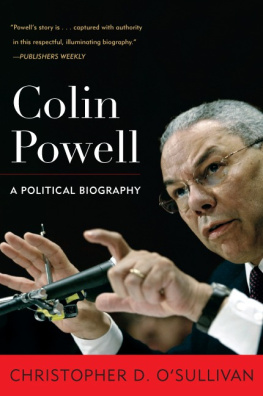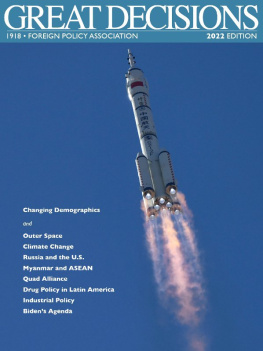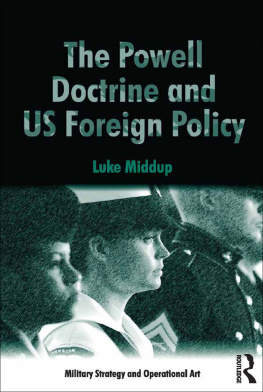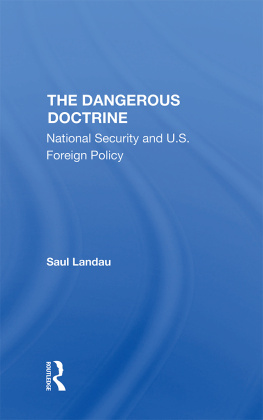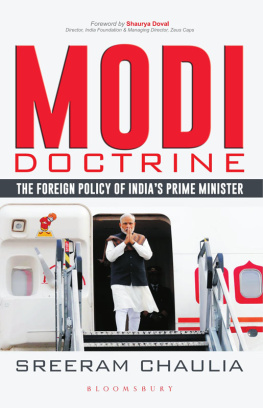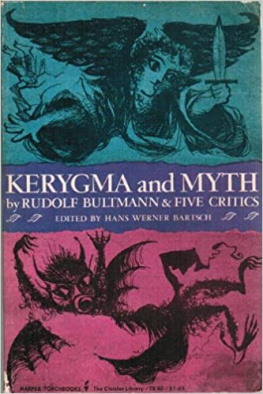Bultmann - The Powell Doctrine and US Foreign Policy
Here you can read online Bultmann - The Powell Doctrine and US Foreign Policy full text of the book (entire story) in english for free. Download pdf and epub, get meaning, cover and reviews about this ebook. City: Array, Farnham, Surrey, year: 2015, publisher: Ashgate Publishing, genre: Politics. Description of the work, (preface) as well as reviews are available. Best literature library LitArk.com created for fans of good reading and offers a wide selection of genres:
Romance novel
Science fiction
Adventure
Detective
Science
History
Home and family
Prose
Art
Politics
Computer
Non-fiction
Religion
Business
Children
Humor
Choose a favorite category and find really read worthwhile books. Enjoy immersion in the world of imagination, feel the emotions of the characters or learn something new for yourself, make an fascinating discovery.

The Powell Doctrine and US Foreign Policy: summary, description and annotation
We offer to read an annotation, description, summary or preface (depends on what the author of the book "The Powell Doctrine and US Foreign Policy" wrote himself). If you haven't found the necessary information about the book — write in the comments, we will try to find it.
Bultmann: author's other books
Who wrote The Powell Doctrine and US Foreign Policy? Find out the surname, the name of the author of the book and a list of all author's works by series.
The Powell Doctrine and US Foreign Policy — read online for free the complete book (whole text) full work
Below is the text of the book, divided by pages. System saving the place of the last page read, allows you to conveniently read the book "The Powell Doctrine and US Foreign Policy" online for free, without having to search again every time where you left off. Put a bookmark, and you can go to the page where you finished reading at any time.
Font size:
Interval:
Bookmark:
THE POWELL DOCTRINE AND US FOREIGN POLICY
Military Strategy and Operational Art
Edited by Professor Howard M. Hensel, Air War College, USA
The Ashgate Series on Military Strategy and Operational Art analyzes and assesses the synergistic interrelationship between joint and combined military operations, national military strategy, grand strategy, and national political objectives in peacetime, as well as during periods of armed conflict. In doing so, the series highlights how various patterns of civilmilitary relations, as well as styles of political and military leadership influence the outcome of armed conflicts. In addition, the series highlights both the advantages and challenges associated with the joint and combined use of military forces involved in humanitarian relief, nation building, and peacekeeping operations, as well as across the spectrum of conflict extending from limited conflicts fought for limited political objectives to total war fought for unlimited objectives. Finally, the series highlights the complexity and challenges associated with insurgency and counter-insurgency operations, as well as conventional operations and operations involving the possible use of weapons of mass destruction.
Also in this series:
Inside Cambodian Insurgency
A Sociological Perspective on Civil Wars and Conflict
Daniel Bultmann
ISBN 978 1 4724 4305 2
The Failure to Prevent World War I
The Unexpected Armageddon
Hall Gardner
ISBN 978 1 4724 3056 4
Understanding Civil-Military Interaction
Lessons Learned from the Norwegian Model
Gunhild Hoogensen Gjrv
ISBN 978 1 4094 4966 9
Air Power in UN Operations
Wings for Peace
Edited by A. Walter Dorn
ISBN 978 1 4724 3546 0
LUKE MIDDUP
ASHGATE
Luke Middup 2015
All rights reserved. No part of this publication may be reproduced, stored in a retrieval system or transmitted in any form or by any means, electronic, mechanical, photocopying, recording or otherwise without the prior permission of the publisher.
Luke Middup has asserted his right under the Copyright, Designs and Patents Act, 1988, to be identified as the author of this work.
Published by
Ashgate Publishing Limited
Wey Court East
Union Road
Farnham
Surrey, GU9 7PT
England
Ashgate Publishing Company
110 Cherry Street
Suite 3-1
Burlington, VT 05401-3818
USA
www.ashgate.com
British Library Cataloguing in Publication Data
A catalogue record for this book is available from the British Library
The Library of Congress has cataloged the printed edition as follows:
Middup, Luke.
The Powell Doctrine and US foreign policy / by Luke Middup.
pages cm. (Military strategy and operational art)
Includes bibliographical references and index.
ISBN 978-1-4724-2565-2 (hardback) ISBN 978-1-4724-2566-9 (ebook) ISBN 978-1-4724-2567-6 (epub) 1. Strategic cultureUnited States. 2. United StatesForeign relations1989- 3. United StatesMilitary policy21st century. 4. United StatesMilitary policy20th century. 5. Persian Gulf War, 1991Influence. 6. Powell, Colin L.Influence. I. Title.
U21.2.M499 2015
355.033573dc23
2014033815
ISBN 9781472425652 (hbk)
ISBN 9781472425669 (ebk-PDF)
ISBN 9781472425676 (ebk-ePUB)
Id first like to acknowledge the enormous contribution that my family has made towards the writing of this book. My parents and my brother have provided emotional and at times financial support to enable me to undertake this project. I would like to thank Professor Matthew Jones and Professor Alex Danchev, their guidance, support, and at times criticisms have been invaluable to the project. I would also like to thank Dr David Milne and Dr Donna Jackson, who read through large parts of the drafts of this book. Donnas advice in particular was crucial to how this book has been organized.
Im enormously grateful to the three scribes who have typed the entire manuscript: Lucy Veale, Hannah Durkin, Rosie Fisher and Steve Doran (Ding, its a book). These three have put up with my constant changes, they were available whenever I needed them, and often as not they were my editors of first resort. I would also like to put on record my thanks to Owen Butler of Nottingham University Student Support for organizing the scribing support without which this book could not exist. Thanks also to Brenda Sharpe and Tricia Craggs of Ashgate Publishing.
There are also people through whose correspondence and hard work this book has benefitted enormously. In particular I would like to single out Lieutenant General Frederick Franks (US Army, Retired), who provided invaluable advice on how US Army Doctrine is written and also pointed me towards several books and papers which proved variously useful. I would also like to thank John Woolley and Gerhard Peters at the University of California, Santa Barbara. Their American Presidency Project is an invaluable resource to any researcher of the US Presidency, and has made the writing of this book far easier than it would otherwise have been. I would also like to place on record my profound gratitude to the staff at the Hallward Library, University of Nottingham, and the British Library for running down seemingly endless obscure books and articles. I would also like to thank the staff at the School of Politics for helping me in ways too numerous to mention.
Finally I would like to thank my Grandfather Sam Middup to whose memory this work is dedicated. Without a childhood spent listening to my Grandads war stories Im all but certain that I would not have had the interest that led to undertaking this research. In every meaning of the phrase, I would not be here without him.
This book will give an account of where the ideas that form the Powell Doctrine came from, to understand how these ideas are logically related to one another to form the Powell Doctrine, and what the effect of the Powell Doctrine has been on US foreign policy since the end of the Vietnam War.
The Powell Doctrine is used as shorthand to describe a series of tests for the use of US Military force laid down by former Chairman of the Joint Chiefs of Staff, General Colin Powell, shortly before his retirement. These conditions are: that the use of force ought to be overwhelming; that the use of force ought to command public and Congressional support; that force should only be used to achieve clear objectives; that force should only be used in the vital national interest; that US Forces should have a clear exit strategy.
The Powell Doctrine does not spontaneously emerge in Powells 1992 Foreign Affairs article. With this article, what Powell did was to lend the significant public stature that he enjoyed in 1992 as one of the most well-known US soldiers since Eisenhower to a set of ideas which had been written about as early as the late 1970s. Indeed, in the early 1990s, Powells standing was such that a Presidential bid was seen as a real possibility. Steven Stark, writing in The Atlantic magazine, quotes a prominent Democratic consultant as saying, His [Powells] potential as a presidential candidate is mind-boggling. On paper, if he got the Republican nomination, I dont see how the Democrats could win. As we shall see throughout this book, Powells 1992 Foreign Affairs article drew together in one place a set of ideas that had emerged from an intellectual climate within the US Military.
Next pageFont size:
Interval:
Bookmark:
Similar books «The Powell Doctrine and US Foreign Policy»
Look at similar books to The Powell Doctrine and US Foreign Policy. We have selected literature similar in name and meaning in the hope of providing readers with more options to find new, interesting, not yet read works.
Discussion, reviews of the book The Powell Doctrine and US Foreign Policy and just readers' own opinions. Leave your comments, write what you think about the work, its meaning or the main characters. Specify what exactly you liked and what you didn't like, and why you think so.

